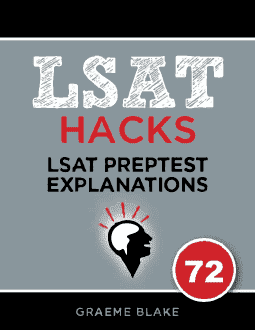DISCUSSION: First, you need to remember the final argument of passage A. The author says that simpler tax systems encourage the rich not to evade taxes, and so the rich end up paying about as much.
As I discussed in the analysis, passage A is confusing two issues. There is a “flat” tax, and a “simplified” tax code. Their final argument is the result of a simplified tax code, but the author uses it to support a flat tax. The author of passage B can counter that a progressive tax system could be simplified without being made flat.
Most of the wrong answers are weird. C, D and E are not even things the author of passage B would agree with. We want to support the author of passage B!
___________
- This isn’t a great response. It’s always possible for people to cheat the tax system. The question is whether a flat tax system reduces the amount of cheating.
- CORRECT. This is a complicated answer. Don’t just skip complicated answers – try to understand them. This answer is saying that loopholes and deductions are the reason the rich can avoid taxes. A tax system could reduce deductions but remain progressive. The advantages described by the author of passage B come mainly from getting rid of deductions, not from flatness.
- This is a stupid argument. Obviously, people at all levels can cheat. But it’s definitely possible that rich people cheat more.
Also, why would the author of passage B say this? They’re arguing we should tax rich people more! They’re not in the business of defending rich people. - So? It doesn’t matter what taxpayers believe. We don’t care what people believe. We care about what’s true. Beliefs can be wrong.
Also, I don’t know why the author of passage B would say this. It has nothing to do with their argument. - This is way out of left field. The author of passage B is making an argument about income tax, and they never mention consumption taxes. So I don’t know why they would bring consumption taxes up now.


Hello,
I eliminated B because the author of passage A acknowledges that the complex code is responsible for tax evasion among high-income earners and not necessarily the progressive tax system itself, so I did not think that B would counter a point that the author of A already grants. Where did my thinking go wrong? Thanks in advance!
The author of Passage A ignores their own evidence in this case. It’s true that the author of passage A implied that deductions are the cause of low taxes on the rich. But the author of passage A ignores their own evidence in the last paragraph! The author of passage A seems to have fixated on Estonia, which did two things at once: elimated deductions, and flat taxes. So perhaps the author mistakenly thinks these two things always go together. Answer Choice B counters this and says that it’s possible for eliminated deductions and graduated taxes to go together instead.